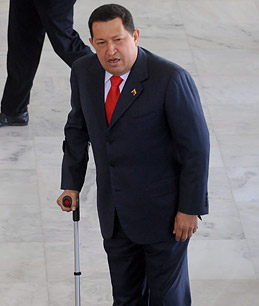
No one ever got rich betting on the demise of Hugo Chvez. As a leftist Venezuelan paratrooper officer, he led a failed coup in 1992, but he was let out of prison just two years later and started campaigning for the presidency, which he won in 1998. In 2002 Chvez himself was the target of a coup; it threw him out of power for a few days, but he survived it. Ditto a 2004 recall referendum. He won re-election as President in 2006 and then a 2009 plebiscite that lets him run as often as he wants.
So I’m not about to assume, as so many are at the moment, that surgery for a pelvic abscess — which has kept Chvez, 56, laid up in a Havana hospital and unusually silent since June 10 — threatens to end his political career if not his life. True, there is genuine cause for speculation about Chvez’s health, if only because the world is getting little more than Twitter messages right now from a leader who is famous for interrupting Venezuelan TV broadcasts so he can talk for hours on end about whatever occurs to him, usually his imperialista enemy the U.S. But medical experts say it can take a few weeks to recover from abdominal abscesses, and that may well be what Venezuelan Foreign Minister Nicols Maduro was referring to over the weekend when he said Chvez is “battling for his health.”
Whatever Chvez’s prognosis is, his hospital hiatus in Cuba has raised questions about the condition of his socialist Bolivarian revolution. On Sunday, June 26, the head of the National Assembly said he was certain Chvez would return for Venezuela’s July 5 bicentennial celebration, a day when Chvez is also supposed to kick off a summit of Latin American leaders on Margarita Island. But until then, with problems like high inflation, chronic power outages and a bloody prison riot outside Caracas vexing the oil-rich South American nation, many Venezuelans are fretting about who’s in charge of their government.
In fact, while Chvez convalesces in Havana, where he was visiting when he was stricken, officials in Caracas sound tongue-tied, as if they are fearful that they might appear to be usurping el comandante’s powers. Vice President Elas Jaua refuses to step in as interim President, even though constitutional experts say it’s required of him at this point, as it would be of the No. 2 in any country, until Chvez is back in the saddle. At the same time, with Chvez set to run for re-election next year, his older brother and political confidante Adn Chvez raised tensions on Sunday by declaring that while their United Socialist Party prefers to retain power at the ballot box, “as authentic revolutionaries, we cannot forget other forms of fighting … including the armed struggle.”
Politicians usually don’t make reckless statements like that unless they’re nervous — and the Chavistas seem genuinely spooked about their 2012 prospects if Chvez can’t run. This points to one of Venezuela’s primary political ailments: Chvez has created a system that makes him indispensable. If Venezuela were the model constitutional democracy he insists it is, his government wouldn’t look like a deer in the headlights right now, with all three branches seemingly gripped by indecision about how to carry on in his medical absence. Since he won the 2009 referendum that eliminated presidential term limits — he lost a similar plebiscite in 2007, but in a constitutionally questionable move, he got to put the question in front of voters again two years later — the subject of grooming a successor has been taboo among his supporters.
See TIME’s photo gallery “Venezuela Cracks Down on Illegal Mining.”
See “The Military Man Who May Win Peru’s Election.”